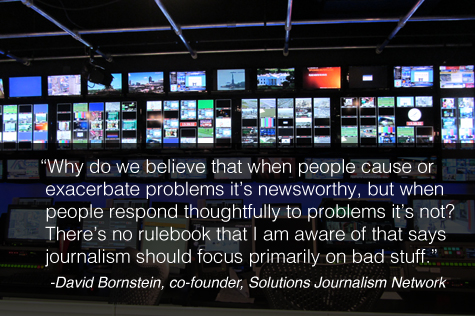Top 10 public health media bites of 2015
by: Heather Gehlert
posted on Tuesday, December 22, 2015
Every day, Berkeley Media Studies Group monitors the news to learn how public health and social justice issues are being portrayed. We scan headlines and scour content to find out what arguments are being made, whose voices are coming through the loudest, and which perspectives are being left out.
Along the way, memorable sound bites — or, as we call them, media bites — often catch our eye or ear. Sometimes they come from journalists, other times from advocates or elected officials, but they all have something in common: They make us stop and reflect on an issue, and they stay in our heads long after the news cycle has moved on to the next big thing.
Advocates can use media bites to make their policy issues relatable to readers and reporters — and to produce outrage or prompt action. A well crafted quote can illicit a reaction like, “That’s right!” or, “I hadn’t thought about it like that,” or, most critically, “We need to change this.”
Each year, we collect dozens of media bites and share our favorites with our colleagues, family and friends. Narrowing the list gets a little harder every year, as advocates keep getting savvier at using the media as a megaphone for change.
Below are our Top 10 picks of 2015, organized by topic. Do you have a favorite that’s not on our list? Share it with us at info@bmsg.org or @BMSG.
Equity
“When all Americans are treated as equal, we are all more free.”
-President Barack Obama, after the Supreme Court ruling in favor of marriage equality nationwide. Appeared June 26, 2015 in the Huffington Post, among other places.
Why we like it: The power in this short, memorable media bite comes from its appeal to shared values. Specifically, it expands our ideas about freedom and shows that equality and freedom are not mutually exclusive. Rather, they go hand in hand.
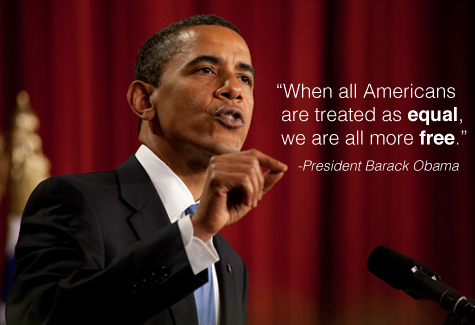
“By design, we have left whole communities behind. By design, we can reverse that and reclaim our nation and all of its people.”
-Rachel Davis, managing director, Prevention Institute. Appeared June 5, 2015 in New America Media.
Why we like it: Part of a commentary on violence prevention, this quote pulls back the lens on community well-being to show that inequitable outcomes are the result of policies and systems that can be remade to focus on prevention. This sentiment is filled with hope, can-do spirit, and provides a powerful antidote to the “us vs them” rhetoric so common in news on crime and violence.
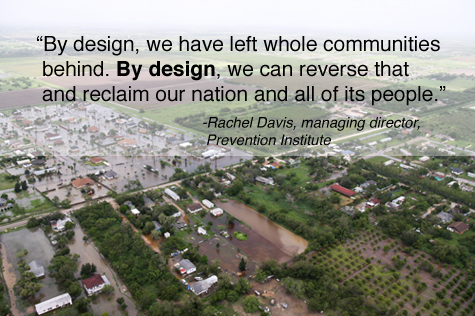
“If we want people to climb the economic ladder through education, then we need to ensure that ladder rests on a stable foundation of work that pays enough to live on.”
-Maureen Conway, executive director of the Aspen Institute Economic Opportunities Program. Appeared in the May/June edition of The Aspen Journal of Ideas.
Why we like it: This vivid metaphor makes tangible the idea that we all need support systems. It provides much-needed context for the up-by-your-bootstraps rugged individualism narrative so dominant in American culture. If forces us to ask, what if the boots have no straps? What if the ground beneath us is crumbling?
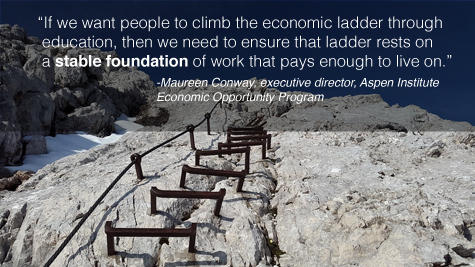
Gun violence
“To protect the public, we regulate toys and mutual funds, ladders and swimming pools. Shouldn’t we regulate guns as seriously as we regulate toys?”
-Nicholas Kristof. Appeared Aug. 26, 2015 in The New York Times.
Why we like it: Drawing a startling comparison, Nicholas Kristof takes a controversial issue and boils it down to common sense. Comparing familiar items or issues can be an effective way for advocates to point out skewed priorities and push for policy change.
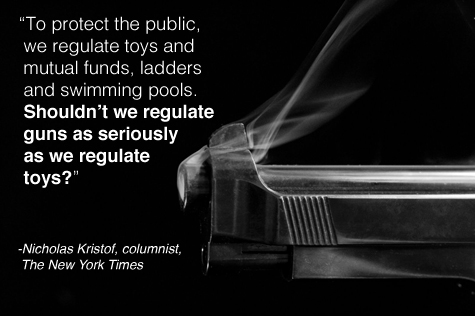
Sexual violence
“It is time to make our culture a more comfortable place for victims than perpetrators.”
-Dani Bostick. Appeared June 10, 2015 in the Huffington Post.
Why we like it: Media coverage of sexual assault often focuses disproportionately on those who have committed crimes, rather than those who experience them. Such coverage reflects and reinforces attitudes, policies and rhetoric that foster abuse and can keep victims/survivors from coming forward after the fact. In just 15 words, this quote puts that culture under the microscope and calls for change.

Food and beverage environment
“Cheap soda has taxed this nation dearly. It’s time to tax it back.”
-Jim O’Hara, director of health promotion policy at the Center for Science in the Public Interest in Washington, D.C. Appeared July 28, 2015 in the Atlanta Forward, a blog of the Atlanta Journal Constitution.
Why we like it: This media bit is short, pithy and empowering. Simply put, it places the focus on the product, not the people who consume it.

“Cigarettes are toxic. They have warning labels. Alcohol is toxic. It has warning labels. Well, guess what? Sugar is toxic at the doses we are currently consuming. And half of it comes from a single source: soft drinks. It’s time for a warning label.”
-Dr. Robert Lustig, professor of pediatrics at the University of California, San Francisco, and president of the Institute for Responsible Nutrition. Appeared March 28, 2015 in the Contra Costa Times.
Why we like it: Short sentences and the repetition of words like “toxic” and “warning” make this quote pack a punch. Its structure creates a sense of momentum and highlights a specific policy solution using strong analogies and plain language.
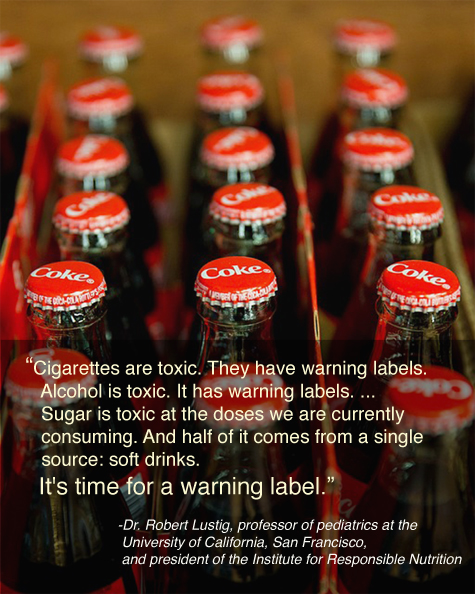
“I’ve been telling the councils, food can either empower us and make us strong, or it can kill us. Healthy food is not just our tradition, it’s our identity.”
-Denisa Livingston, a community health advocate with the DCAA. Appeared March 25, 2015 in Mother Jones.
Why we like it: This media bite puts power at the center of a conversation about the Navajo Nation’s decision to tax junk food in an effort to improve health. It shows that having a voice in our food systems is about more than what we eat — it is about being in control of our lives.
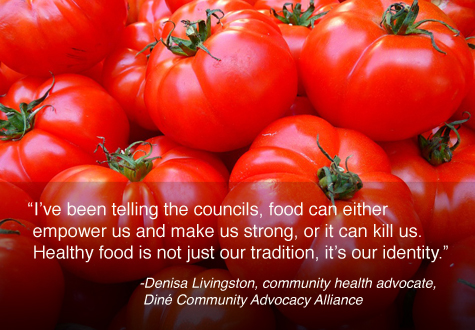
Tobacco
“Our national pastime should be about promoting a healthy and active lifestyle, not a deadly and addictive product.”
-Matthew L. Myers, president of the Campaign for Tobacco-Free Kids. Appeared Feb. 26, 2015 in the Herald and News.
Why we like it: Pithy and memorable, this quote juxtaposes health and tobacco to show that the latter has no place in ballparks. It helps to expose a health threat so common it has been hidden in plain sight.

Media
“Why do we believe that when people cause or exacerbate problems it’s newsworthy, but when people respond thoughtfully to problems it’s not? There’s no rule book that I am aware of that says journalism should focus primarily on bad stuff.”
-David Bornstein, Appeared Jan. 8, 2015 in The New York Times Opinionator.
Why we like it: This thought-provoking media bite questions an aspect of our culture that has become so normalized, many people may fail to even notice it. It makes the invisible visible and challenges the reporters and readers to ask, am I getting the whole picture?
